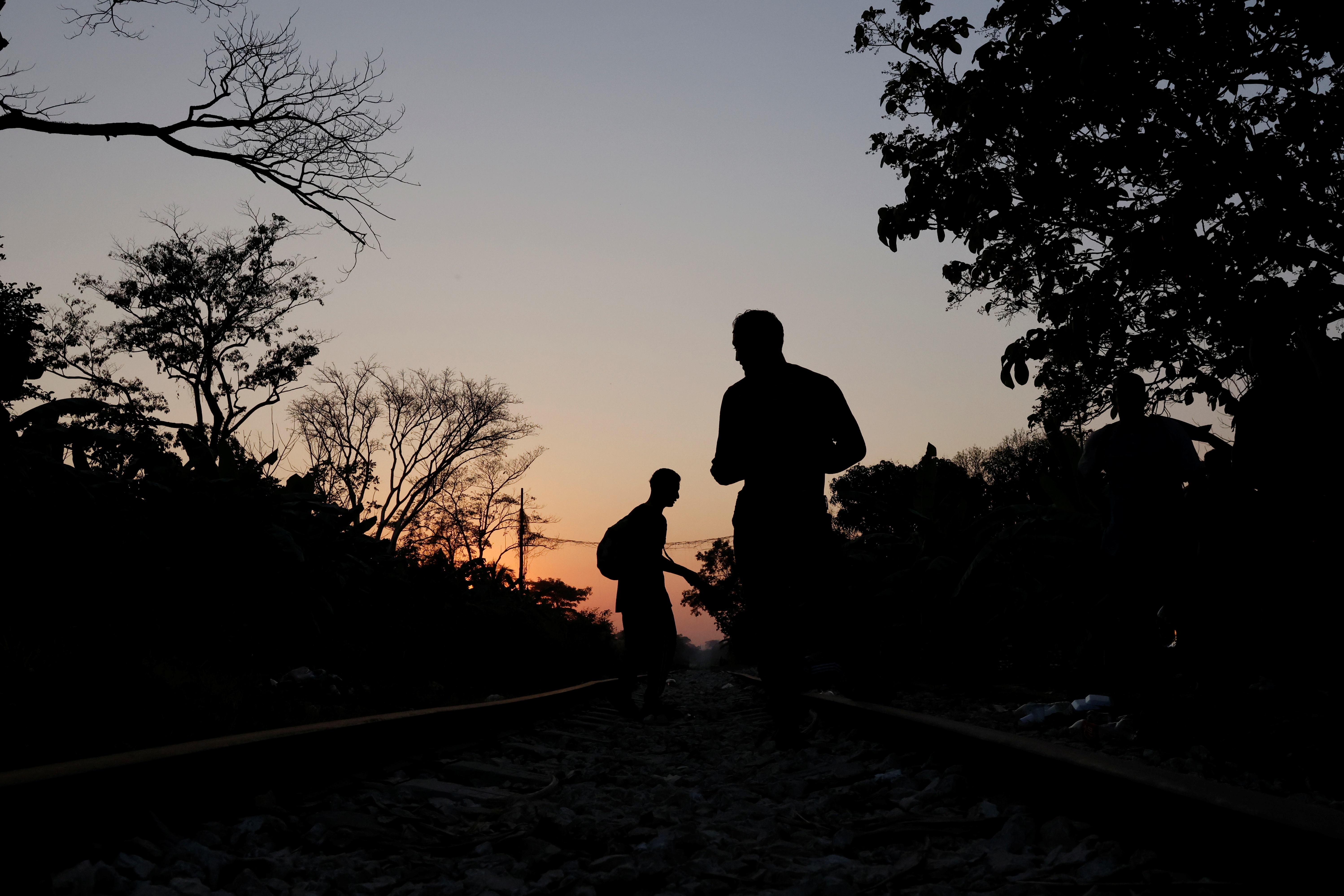Bring Us Your Poor, Unskilled, Uneducated, Oppressed ...
"People from all corners of the globe have sought refuge in Canada, people who have started the next chapter of their lives here in Canada,""There's another reason that Canada's light shines brightly, and that is the contributions of refugees themselves in so many ways.""We've seen refugees give back to their new communities and their countries, even during the pandemic."Minister of Immigration, Refugees and Citizenship Marco Mendicino
 |
| A group of Central American migrants rest along the railway track on their way to the United States in Macuspana, Tabasco, Mexico March 25, 2021. REUTERS/Carlos Jasso |
Immigration Minister Mendicino made an announcement on June 18 that Canada is proceeding with a new target number of refugees into the country of "protected persons"; refugees and asylum seekers set to be accepted for residence in Canada while their applications for acceptance are being determined. That acceptance for residence is to be extended to their families. In 2020 the number brought into Canada stood at 23,500. For 2021 that number is to rise to 45,000.
An estimated 50,000 haven-seekers, migrants declaring themselves 'refugees' entered Canada illegally in the space of two years between 2018 and 2019, numbers that are declining by a wide margin, but still ongoing where people who have entered the United States transit into Canada which has a far more relaxed reputation for accepting migrants' refugee claims. Many of those haven-seekers, are fleeing poverty, crime and conflict in their central American homelands, many seek out better economic prospects.
Many are drawn by Canada's generous social support system which they can draw on as soon as they enter Canada. And many of the migrants are unschooled, unskilled and if and when they look for employment, will only be suitable for low-skill work that will leave them in poverty, albeit with the added assistance of social welfare. Finding places for migrants to live, providing them with initial financial supports, medical care, language training, educational opportunities strains an already-strained system in Canada at all government levels.
In cities like Toronto where many of the refugee declarants head directly for temporary emergency housing -- already under strain to accommodate Canadians who have fallen on hard times and/or those whom the added financial strains of the COVID pandemic's upheaval of social, employment norms have sent into the ranks of the homeless -- an overburdened situation has been exacerbated by the presence of migrants.
In Toronto 40 percent of people in homeless shelters in 2019 were refugees and asylum claimants. Refugees and asylum claimants represented 80 percent of the total families living in shelters in 2018. A 2018 study of homeless shelters in Ottawa revealed that close to 25 percent of those using the shelters were immigrants or refugees. When the viral pandemic struck, close living quarters in shelters convinced many to leave that shared housing in preference to living on the street.
The downtown cores of many cities now reflect the growing number of street people who have left crowded shelters to live in tent cities in public parks and on sidewalks. An issue of public safety has arisen in lock-step with illegal tent cities. So it defies logic and simple common sense to proudly proclaim Canada's readiness to increase by a wide margin an already large committed number of refugees to a country which has been unable to accommodate the needs of newly-entering people.
The Liberal government speaks of "irregular" entries to the country, when what they are is "illegal". There are legal entry points where people can declare themselves and where they know that entering Canada from the United States where a safe country agreement is in effect whereby the first country entered is the country where application should be made, is deliberately bypassed. In illegal entry a strange situation unfolds where the illegals declare themselves refugees and are enabled to make applications to remain in the country.
Germany stands out as the European country that distinguished itself in 2015 and 2016 in its declaration that it was prepared to accept a million refugees and migrants pouring illegally into Europe from Africa and the Middle East. Years later the German government finds itself supporting those they permitted entry to, many of whom are disproportionately involved in violent crime, according to the government's own data. A mere 50 percent of the migrants -- mostly young, single men -- are employed in Germany.
Robust social welfare systems that leave no one behind are viewed by many who have long been citizens and grew up in the system, as a last resort when living turns tough. To many others coming from countries with no notion of public welfare, state support through welfare seems attractive and well worth leaving home for. Those genuinely seek a better life and prepared to work toward it have indeed made Canada what it is, a country of immigrants.
In earlier generations those who entered Canada as immigrants and refugees, many non-skilled, without higher education levels, applied themselves to whatever employment was available. There were no social welfare programs of any note in that era. People lived in poverty and slowly improved their living situations, their children received good educations and found better employment and left poverty behind. At the present time, all manner of government programs in support of immigrants and refugees are available, and, it seems, less effort is put out for self-support by those feeling entitled to state support.
 |
| Police erected a tent at the Roxham Road crossing, a Royal Canadian Mounted Police officer informs a migrant couple about a legal border station a few kilometres away. (Charles Krupa/Associated Press) |
Labels: Canada, Illegal Migrants, Liberal Government, Re-settling, Refugees, Social Welfare, Unemployment
0 Comments:
Post a Comment
<< Home